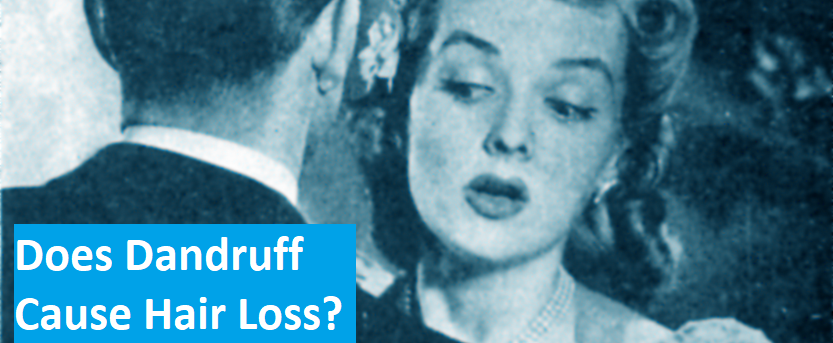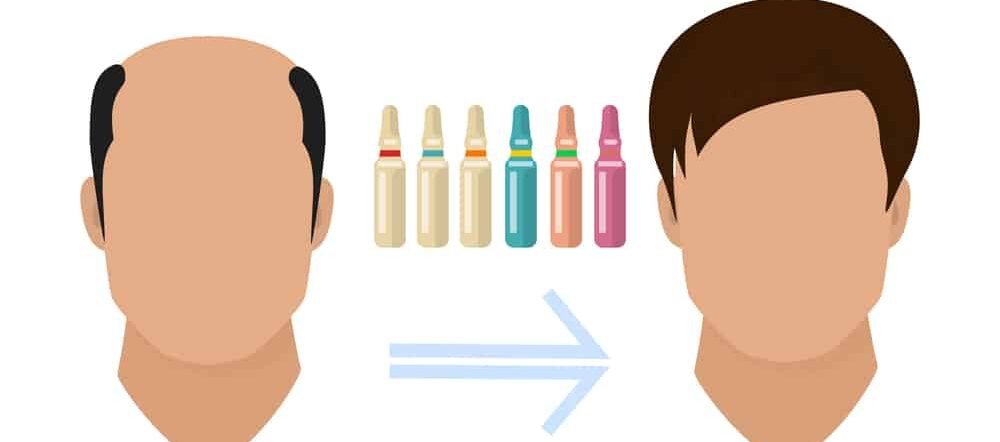Dandruff can cause hair loss. Dry patches are caused by dandruff, a common scalp condition. When it flakes, it leaves behind white particles on your shoulders. Most people do not experience hair loss from dandruff, but some do.
As a result of dandruff, itching can damage your hair cells, resulting in some hair loss, but not complete and permanent baldness.
Also, dandruff can exacerbate hair loss in men and women who suffer from androgenic alopecia, a condition that affects both sexes.
The main goal of fighting dandruff-induced hair loss is to relieve it as much as possible and to reduce the scalp’s irritation. Relief from the effects of dandruff will halt your scratching urges while also protecting your hair follicles from further harm.
What Causes Dandruff, Flaky Scalp and Hair Loss?
Severe dandruff and hair loss due to a flaky scalp is often caused by ringworm, psoriasis, inflammation, seborrheic dermatitis, infections, trauma, auto immune diseases and more.
Tinea capitis
Tinea capitis, often known as ringworm, is a fungal condition that causes severe scratching on the head. Hard flaking or blistering may also appear, and hair may break off in bunches. Signs of dandruff and hair loss may also be caused by other fungal infections. Antimicrobial activity medications can help in managing these conditions.
Psoriasis of the head
Psoriasis is an inflammatory disease that causes the scalp to become uncomfortable and form crusty patches. It produces dandruff-like symptoms despite not being dandruff. Where even the rough patches emerge, bald areas may appear.
Folliculitis decalvans
Folliculitis decalvans is an uncommon inflammation illness that causes hair cells to be destroyed. It also produces itchiness and red areas on the head. Due to the obvious itching that this disease creates, an individual may believe they have dandruff.
Lichen planopilaris
Lichen planopilaris creates a rough, flaking irritation on the head, which is more prevalent among women. It can potentially induce lumps of hair to break out. This illness is not treatable with dandruff medications, yet the indications are comparable to dandruff.
Seborrheic dermatitis
Seborrheic dermatitis can manifest itself in any portion of the skin. It usually targets the head, causing a reddish or greyish scaly irritation that itches and oily spots. It can harm hair follicles if kept unchecked. Scratching the region vigorously may aggravate the problem.
The condition is believed to be caused by the immune system’s reaction to too much Malassezia yeast on the skin. This yeast normally lives on the skin but too much may cause an inflammatory response to it which causes it. A common treatment is an antifungal shampoo that contains the active ingredient ketoconazole.
Pattern baldness
Pattern baldness is a genetic form of loss of hair that can affect equally males and females. Perhaps you are experiencing hair loss regardless of dandruff, and because the two symptoms just happen to occur simultaneously, you believe they are connected or caused by one another when they are not. Remember that correlation does not equal causation.
Telogen effluvium
Infections, trauma, or anxiety can induce telogen effluvium, a type of temporary loss of hair where the hair is shocked and disconnects from the root of the hair and eventually sheds. For example, someone who is under a lot of stress may start noticing their hair is falling out, but eventually new hair can begin to grow once the stress has been relieved.
Autoimmune diseases
Several autoimmune diseases can also lead to the cause of dandruff.
Damage scalp
If the hair is scraped or pulled, or if the scalp becomes damaged, inflamed, or scarred, it may lead to a flaky scalp and either temporary or permanent hair loss in the damaged scalp areas.
Can Dandruff Cause Hair Thinning Permanently?
Hair loss typically does not occur as a result of experiencing dandruff. Scraping your scalp frequently, on the other hand, might harm your hair follicles and cause baldness.
Dandruff may only be a short-term problem that will go away once you figure out what is causing it, and if you find a treatment for it.
Talk to your physician or dermatologist who can assist you in figuring out what’s causing the problem.
Most people sho experience dandruff have only mild symptoms and rarely lose their hair because of it. Persistent and more severe cases of dandruff may cause hair loss. Even if dandruff isn’t the root of the hair loss problem, the irritation or itching it causes can harm the scalp and aggravate hair loss caused by other factors.
Does Dandruff Prevent Hair Growth?
Dandruff does not promote hair loss. Excessive dandruff, on the other hand, can lead an individual to scrape their head so vigorously that it is injured.
Inflammatory response of the hair shafts on a regular basis can cause scarring and damage, reducing or preventing hair growth. This can result in thinned or brittle hair. Contorting the hair, combing it too hard, or itching the scalp can aggravate this form of hair loss.
Is Hair Loss Caused by Dandruff Reversible?
If the hair loss stops and dandruff disappear due to successful treatment, most of the hair should come back, just like any hair that grows back after the previous hair was been shed. The objective is to minimize and relieve scalp irritation and hair follicle damage, which can have long-term impacts on regrowth and long-term hair health.
How to Reduce or Treat Dandruff?
People who have dandruff tend to have a predisposition to dandruff and may experience frequent flare-ups. Some approaches for preventing dandruff-related hair loss, reducing the symptoms and treating it are as follows:
- If your dandruff isn’t responding to dandruff shampoo or additional treatments, see a dermatologist or similar healthcare specialist. Consult a professional if your hair is falling out in clumps, as this could indicate a scalp or hair problem.
- Wash your hair regularly but not too frequently. Dandruff can be exacerbated by brushing as it may irritate the scalp. Caucasians and Asians might need to shampoo their hair more regularly than Africans, according to the American Academy of Dermatology.
- Cleaning or combing your hair vigorously, as well as rubbing or irritating your scalp, should be avoided. If your scalp becomes irritated, it might be a sign that you are doing something too frequently or aggressively. Try a more gentle approach to caring for your hair.
- If the itching becomes intolerable, talk to your doctor about treatments.
- Hairstyles that are too tight should be avoided. These can pull too much on the hair and cause harm and slow hair development. Too stiff hairstyles can also cause hair breakage.
- Don’t put off treating your dandruff. At the first indication of dandruff, try to use an over-the-counter dandruff shampoo, and seek professional treatment if conditions do not subside after a week or so.
- If you believe your dandruff is caused by a dry scalp, it may be appealing to shampoo your hair less frequently. Regardless of whether the reason is dehydration or oily skin, you should rinse your hair regularly to remove flakes and debris buildup from your scalp.
Conclusion
This was an in-depth review of how dandruff may cause hair loss. Hair loss is a prevalent problem that may or may not be caused directly or indirectly by dandruff, but irritation and excessive itching can harm the scalp and hair and thereby cause hair loss. We hope this was helpful in your fight against dandruff.




